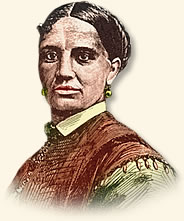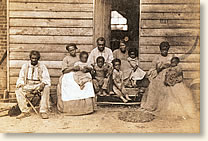|
A Slave's Life
Elizabeth Keckley lived a remarkable life.
She was born a slave; however, through her talent and persistence, she was able
to buy her freedom and eventually became the seamstress and confidant of Mary
Lincoln when she was First Lady.
Elizabeth's , or "Lizzie" as she was called, odyssey began with her birth in
Virginia around 1818. When she was about fourteen she was given to her master's
eldest son as a wedding present. The son, a Presbyterian minister, soon moved
his household to North Carolina where he became the pastor of a small parish.
It was here that she gave birth at age eighteen to her only child - a son - the
result of an unwanted sexual relationship with a white man whom she never named.
 |
Elizabeth Keckley
from a contemporary illustration
ca. 1868 |
After a few years, Lizzie was returned to Virginia as she became the slave of the daughter of her original master and her husband. The bright spot of this change in her life was that Lizzie was reunited with her mother. Her new household suffered hard times that prompted a move to St. Louis where they hoped their fortunes would improve. Unfortunately, the family's new location did not strengthen its economic situation and a new plan was developed. Lizzie, who had learned her sewing skills from her mother, would be hired out as a seamstress.
Lizzie's talent as a seamstress soon attracted a large following. Her business
prospered - although her earnings went to her master. As she said: "with my
needle I kept bread in the mouths of seventeen persons for two years and five
months." Lizzie's circumstances changed when her master told her she could
buy her release from slavery for $1,200.00 (approximately $27,000 in today's money). Her patrons loaned her the money
and her freedom and that of her son, were granted in 1855. By 1860, the two
had made their way to Washington, D.C. where Lizzie set up shop. Her skills
again resulted in a large and influential clientele including Mary Lincoln
who hired Lizzie as her personal maid and seamstress.
In 1868, Lizzie wrote a memoir of her experiences as a slave. Because she never benefited from any formal education, some have questioned whether she actually authored this work. None, however, have questioned the authenticity of her experiences:
"My life has been an eventful one. I was born a slave - was the child of slave parents... I am now on the shady side of forty, and as I sit alone in my room the brain is busy, and a rapidly moving panorama brings scene after scene before me, some pleasant and others sad; and when I thus greet old familiar faces, I often find myself wondering if I am not living the past over again...
My master, Col. A. Burwell, was somewhat unsettled in his business affairs, and while I was yet an infant he made several removals. While living at Hampton Sidney College, Prince Edward County, Va., Mrs. Burwell gave birth to a daughter, a sweet, black-eyed baby, my earliest and fondest pet. To take care of this baby was my first duty. True, I was but a child myself - only four years old - but then I had been raised in a hardy school - had been taught to rely upon myself, and to prepare myself to render assistance to others...
The baby was named Elizabeth, and it was pleasant to me to be assigned a duty in connection with it, for the discharge of that duty transferred me from the rude cabin to the household of my master. My simple attire was a short dress and a little white apron. My old mistress encouraged me in rocking the cradle, by telling me that if I would watch over the baby well, keep the flies out of its face, and not let it cry, I should be its little maid...
I began to rock the cradle most industriously, when lo! out pitched little pet on the floor, I instantly cried out, "Oh! the baby is on the floor;" and, not knowing what to do, I seized the fire-shovel in my perplexity, and was trying to shovel up my tender charge, when my mistress called to me to let the child alone, and then ordered that I be taken out and lashed for my carelessness.
The blows were not administered with a light hand, I assure you, and doubtless the severity of the lashing has made me remember the incident so well. This was the first time I was punished in this cruel way, but not the last. The black-eyed baby that I called my pet grew into a self-willed girl, and in after years was the cause of much trouble to me...
I was my mother's only child, which made her love for me all the stronger. I did not know much of my father, for he was the slave of another man, and when Mr. Burwell moved from Dinwiddie he was separated from us, and only allowed to visit my mother twice a year-during the Easter holidays and Christmas. At last Mr. Burwell determined to reward my mother, by making an arrangement with the owner of my father, by which the separation of my parents could be brought to an end. It was a bright day, indeed, for my mother when it was announced that my father was coming to live with us. The old weary look faded from her face, and she worked as if her heart was in every task. But the golden days did not last long...
 |
| Slave quarters ca. 1860 |
[one morning] Mr. Burwell came to the cabin, with a letter in his hand. He was a kind master in some things, and as gently as possible informed my parents that they must part; for in two hours my father must join his master at Dinwiddie, and go with him to the West, where he had determined to make his future home. I can remember the scene as if it were but yesterday; - how my father cried out against the cruel separation; his last kiss; his wild straining of my mother to his bosom; the solemn prayer to Heaven; the tears and sobs - the fearful anguish of broken hearts. The last kiss, the last good-by; and he, my father, was gone, gone forever.
My father and mother never met again in this world. They kept up a regular correspondence for years, and the most precious mementoes of my existence are the faded old letters that he wrote, full of love, and always hoping that the future would bring brighter days.
When I was about seven years old I witnessed, for the first time, the sale of a human being. We were living at Prince Edward, in Virginia, and master had just purchased his hogs for the winter, for which he was unable to pay in full. To escape from his embarrassment it was necessary to sell one of the slaves. Little Joe, the son of the cook, was selected as the victim. His mother was ordered to dress him up in his Sunday clothes, and send him to the house. He came in with a bright face, was placed in the scales, and was sold, like the hogs, at so much per pound. His mother was kept in ignorance of the transaction, but her suspicions were aroused.
When her son started for Petersburgh in the wagon, the truth began to dawn upon her mind, and she pleaded piteously that her boy should not be taken from her; but master quieted her by telling her that he was simply going to town with the wagon, and would be back in the morning. Morning came, but little Joe did not return to his mother. Morning after morning passed, and the mother went down to the grave without ever seeing her child again...
'When I was quite a child, an incident occurred which my mother afterward impressed more strongly on my mind. One of my uncles, a slave of Colonel Burwell, lost a pair of plough-lines, and when the loss was made known, the master gave him a new pair, and told him that if he did not take care of them he would punish him severely. In a few weeks the second pair of lines was stolen, and my uncle hung himself rather than meet the displeasure of his master. My mother went to the spring in the morning for a pail of water, and on looking up into the willow tree which shaded the bubbling crystal stream, she discovered the lifeless form of her brother, suspended beneath one of the strong branches. Rather than be punished the way Colonel Burwell punished his servants, he tock his own life. Slavery had its dark side as well as its bright side."
References:
Keckley, Elizabeth, Behind the Scenes, or Thirty Years a Slave
and Four Years in the White House (1868, republished 1988).
How To Cite This Article:
"A Slave's Life", EyeWitness to History, www.eyewitnesstohistory.com (2007).
|






